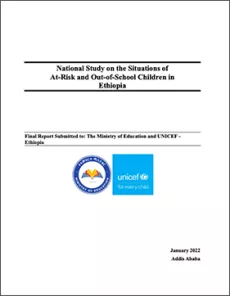National Study on the Situations of At-Risk and Out-of-School Children in Ethiopia
Country study on out-of-school children
Highlights
Despite commendable progress on expanding school access at the pre-primary, primary, and secondary school levels, educational disparities and high out-of-school rates persist in the Ethiopian education sector. Moreover, recent developments such as the global COVID-19 pandemic and armed conflicts, inter-communal violence, and humanitarian crises in the regions of Tigray, Benishangul-Gumuz (Metekel Zone), Oromia (west Guji Zone), and SNNP (Konso Zone) have impeded efforts to expand educational access in Ethiopia.
To understand the current challenges and barriers that are driving out-of-school rates, UNICEF Ethiopia, in partnership with the Ethiopian Ministry of Education (MoE), contracted the American Institutes for Research (AIR) to provide consultancy services for a National Study on the Situations of Out-of-School Children (OSSC) in Ethiopia. The objectives of this study were to provide updates on the prevailing trends and profiles of out-of-school and at-risk primary and secondary students in Ethiopia, to highlight the factors that drive out-of-school rates, and to analyse the gaps in existing policies, strategies, and programmes that aim to improve school enrolment and retention. Ultimately, the study aims to help UNICEF, Ethiopia’s MoE, and other key stakeholders to more effectively address the barriers that keep children out of school. The findings of the study will also inform the implementation of the Education Sector Development Programme VI and the country’s 2020-2025 Country Programme Document.

